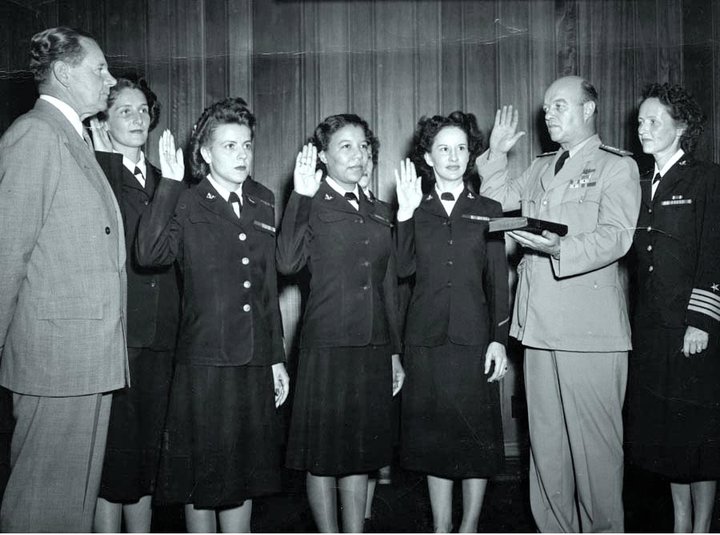The Yeoman (F)s, popularly called ‘Yeomanettes’ to their objection, were established by Secretary of the Navy Josephus Daniels in 1917 after U.S. entry into World War I.
“Women had not received the right to vote when the Navy began the program,” said Kenneth Holliday, National Cemetery Administration (NCA) learning resource officer and Army Veteran. “The Navy recognized it needed more resources early in the war.”
At the time, the Navy was the only service branch within the U.S. armed forces to enlist women for service in a similar status with men. The expanding mission of the Navy and Marines prompted a need for more clerks and stenographers, while also needing to free male Sailors and Marines for duty at sea and abroad. Recruited at first just for clerical duties, by the end of the war their jobs included being language translators and manufacturing munitions in factories.
“When you visit a national cemetery like Alexandria National Cemetery (ANC), you will see the final resting place of many women Veterans,” Holliday said. “There are two ‘Yeomanettes’ buried at ANC. They are not buried in a women’s section. They are buried alongside the men. National cemeteries cross boundaries of race, rank and gender. Everyone is equal regarding their service to our country.”
The two Yeomanettes buried at Alexandria are Lulu Hogue (1876-1967) and Estelle Edwards (1892 – 1967). Records show that 11,000 Yeoman (F)s, 1,713 women nurses, and 269 women Marines (Marinettes) served in World War I. For many years they, along with Army nurses, were the only women eligible to join the American Legion and the only women eligible to receive a bonus earned by Veterans of World War I.
“This program was hugely successful, with thousands of women joining,” said Jessica Tozer, NCA web communications officer and Army Veteran. “They had no idea the program was going to be so ground breaking.”
“It was the first-time women shared the same rank, respect, pay and promotion potential as male sailors,” Tozer said. “It was one of the most important events in military history, as some of the Yeoman (F)s served aboard ships.”
The Yeoman (F)s were of such invaluable service to the country that there was no question of women returning to Navy service during World War II as the Women Accepted for Voluntary Emergency Service (WAVES).
The success of the Yeoman (F) program and WAVES paved the way for the 1948 permanent establishment of women in Navy.
“The Yeoman (F)s provided exceptional service during World War I and set the standard of excellence for women in the U.S. military which is carried on today,” Tozer said. “We salute the memory of the Yeomanettes and thank them for their service to our country.”
Alexandria National Cemetery is one of the original 14 national cemeteries established in 1862. The first burials made in the cemetery were soldiers who died during training or from disease in the numerous hospitals around Alexandria, Virginia. By 1864, the cemetery was nearly filled, which eventually led to the planning, development and construction of Arlington National Cemetery.
About the author:
Shawn D. Graham is a public affairs specialist with the National Cemetery Administration. Shawn is a retired U.S. Navy chief petty officer who served his country for nearly 21 years. He has deployed numerous times to remote regions to include Afghanistan and Uganda.
Topics in this story
More Stories
Summer Sports Clinic is a rehabilitative and educational sporting event for eligible Veterans with a range of disabilities.
Report examines the input of over 7,000 women Veterans: They are happier with VA health care than ever before.
Veterans and caregivers, you can help shape the future eligibility requirements for the VA Caregiver Support program.






